NC State Extension Agent Advocates for Agriculture
go.ncsu.edu/readext?1010165
en Español / em Português
El inglés es el idioma de control de esta página. En la medida en que haya algún conflicto entre la traducción al inglés y la traducción, el inglés prevalece.
Al hacer clic en el enlace de traducción se activa un servicio de traducción gratuito para convertir la página al español. Al igual que con cualquier traducción por Internet, la conversión no es sensible al contexto y puede que no traduzca el texto en su significado original. NC State Extension no garantiza la exactitud del texto traducido. Por favor, tenga en cuenta que algunas aplicaciones y/o servicios pueden no funcionar como se espera cuando se traducen.
Português
Inglês é o idioma de controle desta página. Na medida que haja algum conflito entre o texto original em Inglês e a tradução, o Inglês prevalece.
Ao clicar no link de tradução, um serviço gratuito de tradução será ativado para converter a página para o Português. Como em qualquer tradução pela internet, a conversão não é sensivel ao contexto e pode não ocorrer a tradução para o significado orginal. O serviço de Extensão da Carolina do Norte (NC State Extension) não garante a exatidão do texto traduzido. Por favor, observe que algumas funções ou serviços podem não funcionar como esperado após a tradução.
English
English is the controlling language of this page. To the extent there is any conflict between the English text and the translation, English controls.
Clicking on the translation link activates a free translation service to convert the page to Spanish. As with any Internet translation, the conversion is not context-sensitive and may not translate the text to its original meaning. NC State Extension does not guarantee the accuracy of the translated text. Please note that some applications and/or services may not function as expected when translated.
Collapse ▲Johnston County farmers have an important story to tell. It is a tale of history and heritage, of 200-plus years as one of the top agricultural counties in North Carolina, of feeding families locally, regionally, and even globally.
It is one of resilience and adaptability, with farmers responding to a changing landscape by diversifying crops and embracing new revenue streams such as agritourism.
And it is a story of challenge, of striving to remain profitable and to hold on to family farms in the face of development pressure.
Nicole Youngblood is there to tell the story.
Youngblood is the agricultural communications and marketing agent at NC State Extension’s Johnston County Center. Her job is to advocate for farmers, to get the word out about their goods and services through initiatives such as JoCo Grows Agriculture that spotlight homegrown products, by hands-on help with their social media and other outreach efforts, and always being ready to tell anyone who will listen about the vital role they play in the county and state.
“I am fighting for agriculture here every day,” she said. “Farmers are very humble people, so they don’t want to talk about themselves or self-promote. It takes someone like me to come in and say, ‘What you’re doing is special. We’ve got to tell people about it.’ I will literally sit down and write a blog post about a farm that people might not have ever known.”
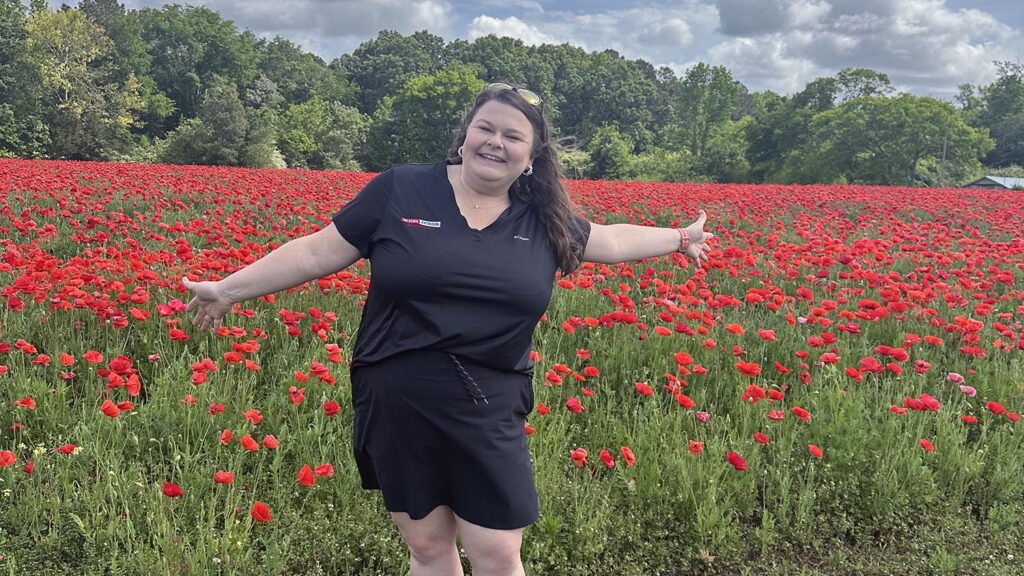
Nicole Youngblood’s mission is to spotlight the efforts of farms in Johnston County, including this one that supplies wildflower seeds all over the country, including for highway beautification efforts.
She also looks for grants available for farmers and helps them write proposals; seeks out events that she can attend with a JoCo Grows Agriculture tent and swag to draw attention to local agriculture; and organizes special events such as Pea Shellin’ and Storytellin’ that are designed to educate newcomers about Johnston County’s rich agricultural heritage.
“I just want to be a positive cheerleader for our farmers and for farm families,” she said. “It seems like that’s getting harder and harder for these folks every day.”
Agriculture is a major industry in Johnston County, supporting 14% of total country jobs. Annual farm receipts are more than $275 million, ranking in the top 20 in North Carolina. But farmland is under significant threat.
North Carolina’s population growth is among the top five in the nation, as people are drawn to the state’s favorable economic conditions, job opportunities, relatively modest housing prices, and moderate climate. Johnston County has proved especially attractive to newcomers. The population is growing at a faster rate than any other North Carolina county, according to census data from 2020. It has swelled from about 170,000 people in 2010 to nearly 235,000 in 2022 — a 38% growth rate — according to USA Facts.
The influx has led to a troubling paradox. There are more people to feed, but less farmland.
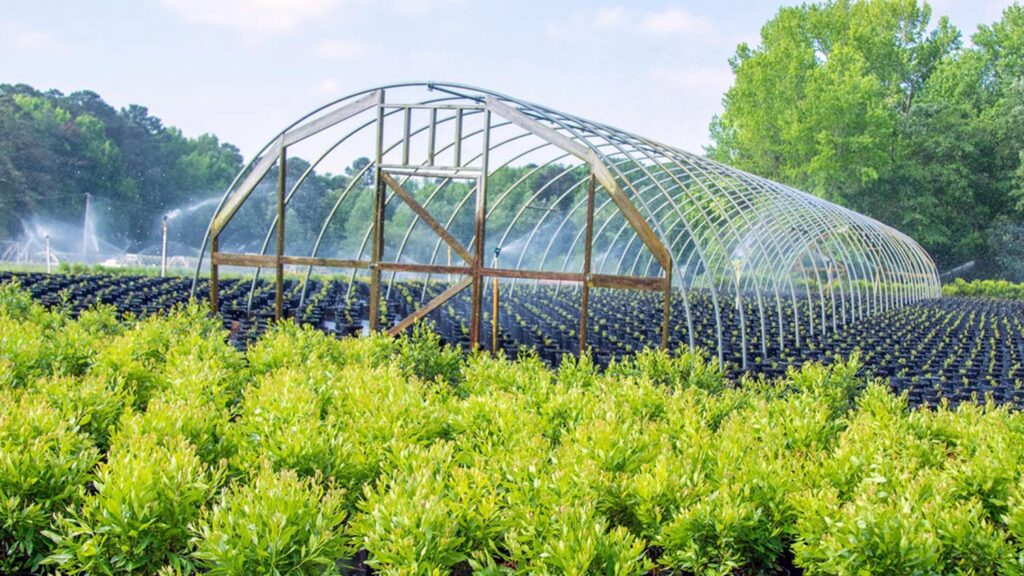
NC State Extension agents are fighting to preserve farmland in Johnston County.
A growing population creates demand for more housing, more neighborhoods. There is significant pressure on farmers to sell to developers. The American Farmland Trust reports that Johnston County is in the top 20 counties in the nation under the greatest threat of farmland loss.
“The timing has become critical,” Youngblood said. “Statistics show 2,000 acres of farmland is lost in the United States every day. To think that we’re seeing it here, it’s scary.”
Riding with Youngblood through the county’s highways and byways is to experience the recent history in microcosm. She points to a housing development out the right window. That used to be a farm, she says. Another new neighborhood comes up on the left. It was also a farm. Now it houses residents who commute to neighboring counties for work.
Related: Share the Road with Farmers
Perhaps the best way to preserve farmland is to help farmers remain profitable. NC State Extension’s Johnston County Center has several agents dedicated to helping producers, including county director and field crops agent Bryant Spivey, field crops agent Tim Britton, commercial horticulture agent Seth Ballance, livestock agent Dan Wells, and horticulture agent Marshall Warren.
Youngblood was hired in October 2022 to augment their work. Although she holds a crop sciences degree from NC State’s College of Agriculture and Life Sciences, her role is not to help farmers grow crops but rather to amplify the importance of their efforts.
“When our agents are doing their programming, I try to figure out how I can enhance that,” she said. “How do I not piggyback on their work, but support it?”
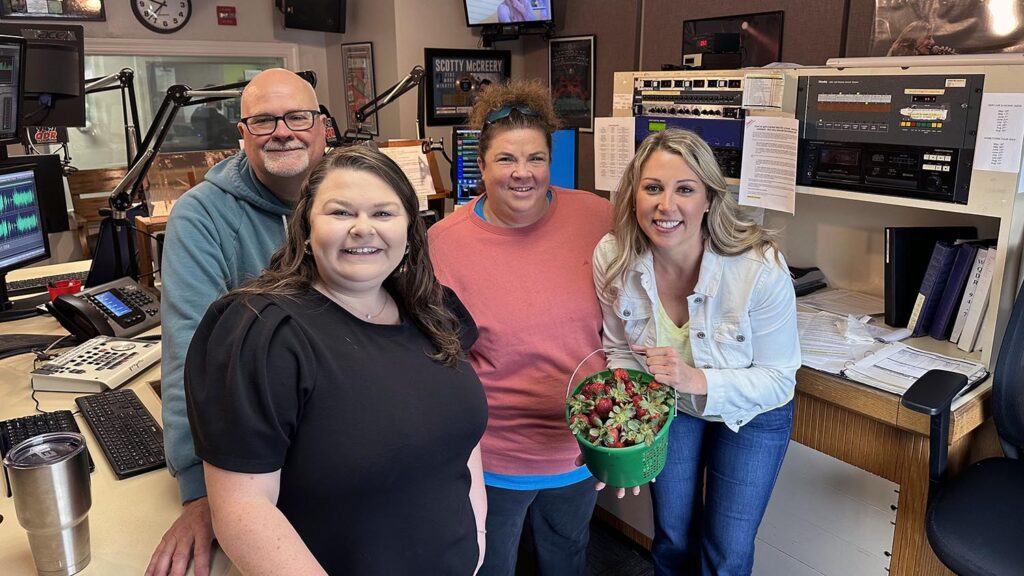
Nicole Youngblood and Johnston County farmer Denise Worley went on Raleigh radio station 94.7 QDR’s morning show with hosts Mike Wheless and Amanda Daughtry to tell listeners about strawberry season and encourage them to visit pick-your-own operations in Johnston County.
She does it by getting to know the farmers in her county, talking to them about their challenges and successes, and asking how she can help. Sometimes she is introduced by a friend or colleague. Often, she just shows up.
“If I hear about a farm or an agribusiness that I haven’t visited or don’t have a connection with, I first ask my fellow agents in the county office if they know them or have a connection and can introduce me,” she said. “If it’s a new farm and we want to meet them, I’ll go out there. There’s a lot of value in going to people’s farms. I’ll definitely take phone calls or email with people. But I do like to make an effort to go to them and see their farm.”
That’s how she met Jeff Wood of Wood Angus Farm, a multigenerational farm in the McGee’s Crossroads community.
Russell and Elaine Wood have produced Angus cattle and Duroc hogs for decades. When economic conditions changed during Covid, their son Jeff Wood, who is in charge of day-to-day operations, knew they needed to diversify. He added direct-to-consumer sales and, as restrictions eased, an on-farm store. They converted a barn to a wedding venue and event space.
“Where we’re bringing in the most money right now is through beef sales in our store,” Jeff Wood said. “It was something we kind of did on the side. And then Covid came along and people started turning towards local producers, local farmers, to get their meat products and dairy products.”
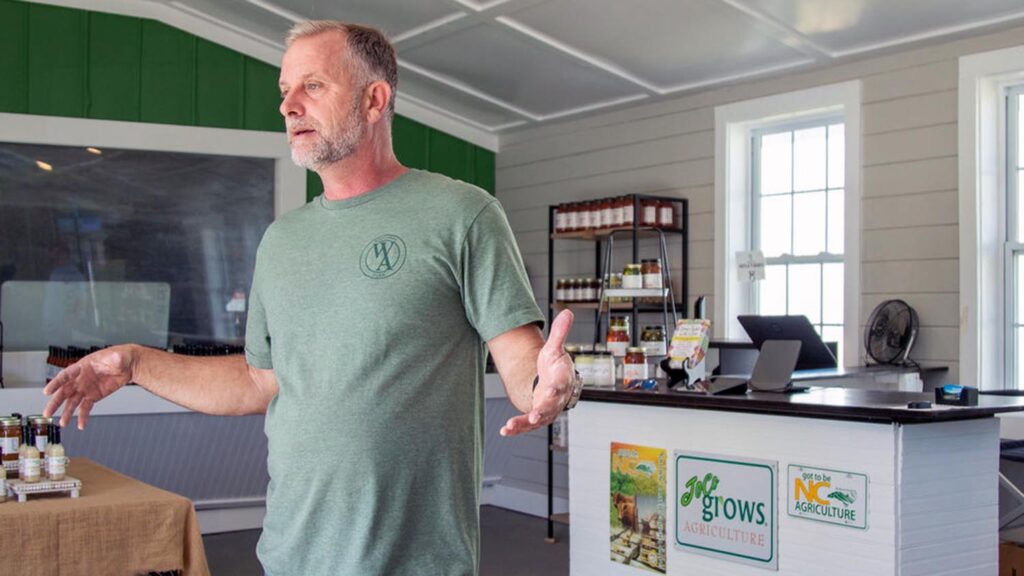
Nicole Youngblood has helped Jeff Wood promote the products at the Market at Wood Angus.
The Market at Wood Angus opened the same month Youngblood moved into her role. The new agent soon made herself known to the family and asked how she could support their efforts.
“Nicole has been fantastic,” Wood said. “She doesn’t wait for me to come to the office or call her. She reaches out to me to see how she can help us. In fact, the first time I even knew that she had the position was because she came out here and introduced herself to us. She’s been very good about making sure we have materials to advertise our Got to Be NC membership, and letting me know about any marketing opportunities that we can be a part of. I can call or text and she is super responsive. Working with her is a real pleasure.”
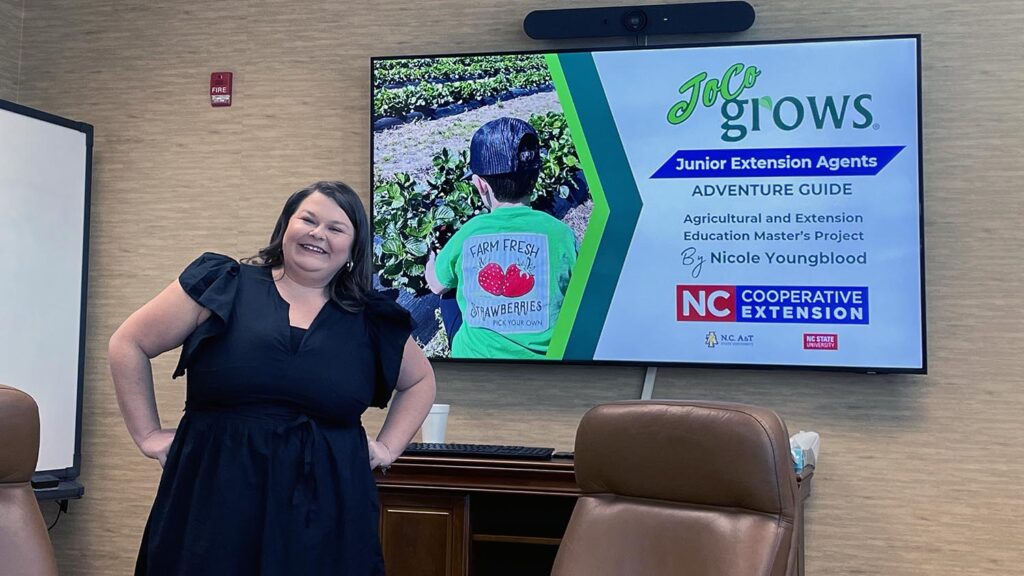
Nicole Youngblood did a project on JoCo Grows Agriculture while pursuing her master’s in agricultural and Extension education from CALS. JoCo Grows Agriculture promotes the efforts of farmers in Johnston County.
Jeremy Norris has a similar story. Norris is owner of Broadslab Distillery, a grain-to-glass operation in Benson. He grows corn and rye on a farm that used to belong to his grandfather and distills it into whiskey. He has a tasting room and a shop. He has converted barns into a wedding destination, an event center, and a three-unit rental space.
“We’re trying to create a destination, but it’s hard to get people out here,” he said. “We’re doing billboards, and we’re trying to pick up our social media game. We’ve got a cool concept and a cool brand. But if you don’t have the marketing behind it, nobody will know about it.”
Marketing just happens to be in Youngblood’s job description. She has featured Broadslab on the JoCo Grows Agriculture website, and personally escorted tours to the farm.
“It’s very similar to all of our farms in making sure that I’m familiar with their products and seeing if there are any programs or grants that would benefit them,” she said. “They have a great story, great products. When people visit Johnston County it is a great place for us to bring them.”
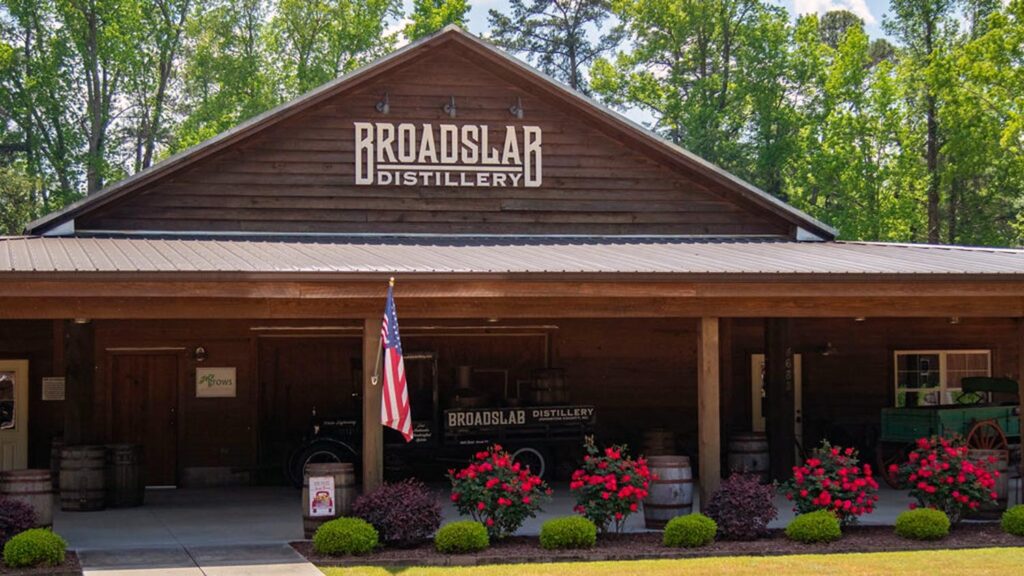
Helping farmers transition to agritourism and with other value-added efforts helps ensure their profitability.
Youngblood also takes people to agritourism spaces such as Smith’s Farm Market and Garden Center in Benson. The family-friendly venue offers greenhouse vegetables, nursery plants, pick-your-own strawberries and blueberries, and gift items, along with ice cream and coffee.
“I’m a firm believer of showing people instead of just telling them,” she said. “It takes more time, but I like to show people what products we have and what our farms offer not only product-wise, but experience-wise. We’re standing on this porch right now drinking coffee, talking about life. I don’t know how to quantify it, but it’s valuable. People don’t care about a farm until they have that personal connection.”
Related: Nicole Youngblood Mentors a CALS Student
Agritourism is ideal for show-and-tell tours, but her outreach efforts don’t stop there. She also looks for ways to tell the story of farms that are not equipped to receive guests.
“We’ve got farms in our county that are producing a lot of food that will never be visitor-ready, but they’re critical for our food supply,” she said. “When I can tell the story of the farm that is not visitor-ready, people are seeing that value and still care. We’re all a part of this community. Making those connections is where the rubber is going to meet the road on preserving farms.”
Regardless of the type of farm, caring is the motivating factor in Youngblood’s efforts. It is something she has in common with NC State Extension agents across North Carolina.
“One thing I love about working with Extension — and it’s true of just about every agent I’ve ever met and talked to — is it’s not just a job,” she said. “I don’t want to be too cheesy, but it’s almost like a calling. We’re serving people. This is not an 8-to-5 job. I don’t know how an Extension agent could ever have an 8-to-5 job. That would be a really hard boundary to draw.”
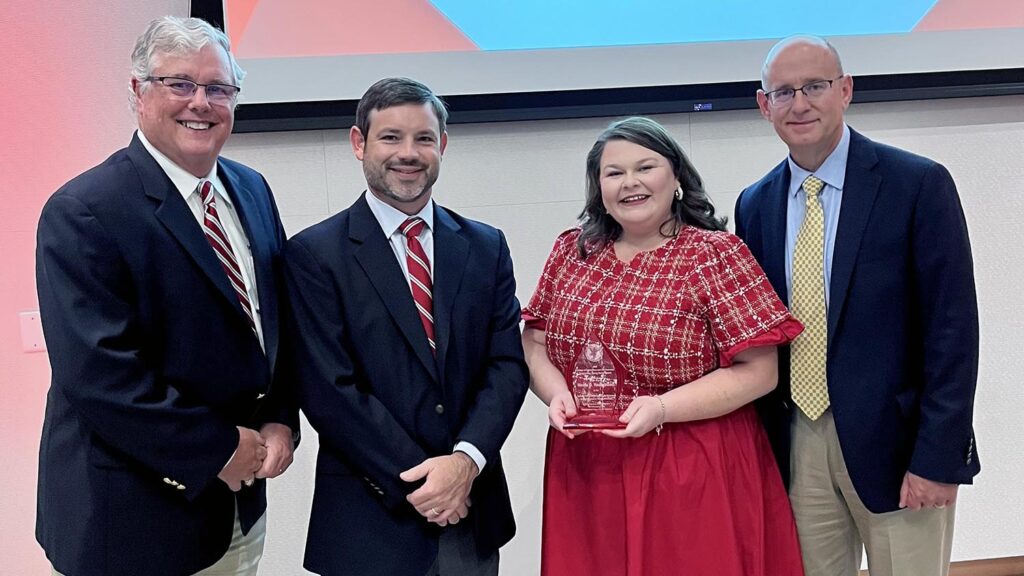
Nicole Youngblood, pictured with Dr. Jeff Mullahey, Dr. Matthew Vann, and Johnston County Center director Bryant Spivey, received the Outstanding Young Alumni Award for the Crop & Soil Sciences Department at the CALS Alumni Award Ceremony in 2023.
Her work is especially meaningful because she was born and raised in Johnston County. She grew up on Homestead Road, across the road from a farm belonging to “Papa Stacy” and “Mama Jean”.
“They weren’t my grandparents, but I spent every day with them,” she said. “I would ride the golf cart, checking cows. I would run errands with them, going to town, all the things that went on at a farm. They treated me like their own.”
She also spent time on the Honeycutt farm, helping “Mr. Glenn” feed and water the cows, and with “Uncle Harry” and “Aunt Beth,” who had a small garden and chickens in the yard.
“I had a lot of agriculture around me and all those farmers treated me like their family,” she said. “I feel like what I’m doing is for people like them. They’ve been good to me and I want to be good to them. I was born right here in Smithfield, and I’ve just always loved it. I feel so connected to my county and I’ve never thought about living anywhere else.”
These are challenging times for Johnston County farmers and for the agents who work with them. But Youngblood is confident the challenges can be overcome.
“We’ve got two things going on,” she said. “We’ve got a lot of growth in Johnston County, and we’ve got a strong agricultural background and heritage. Agriculture is not just part of our past. It’s also part of our future.”

